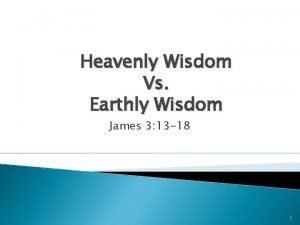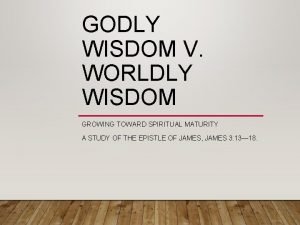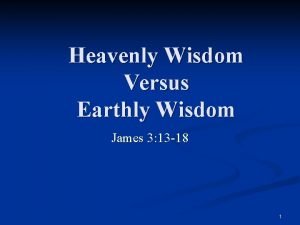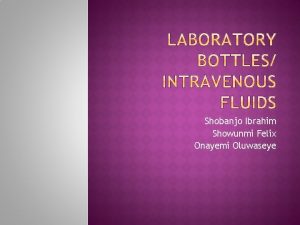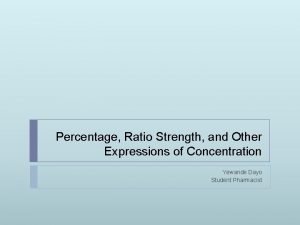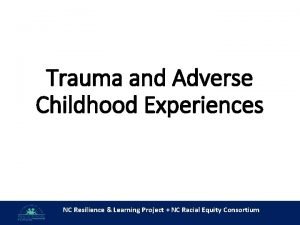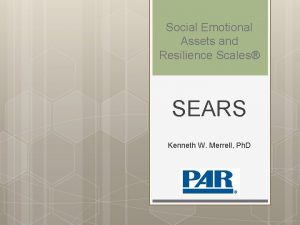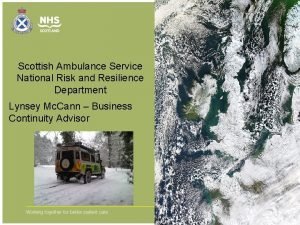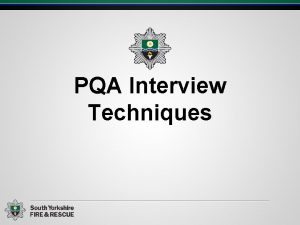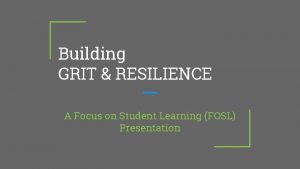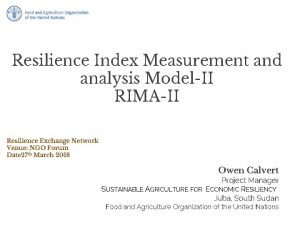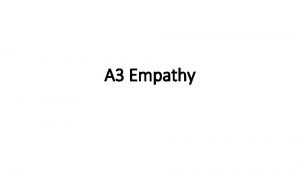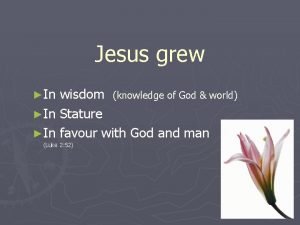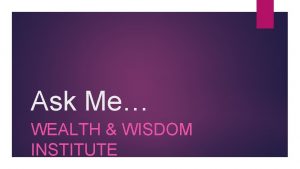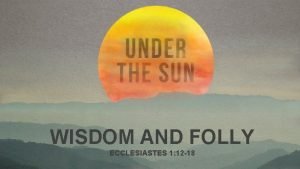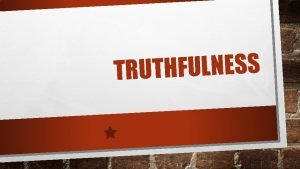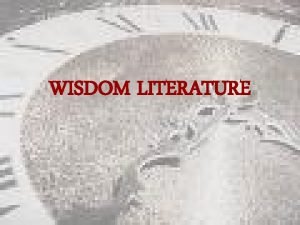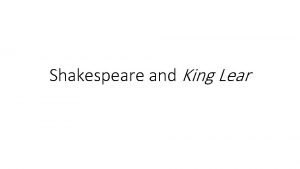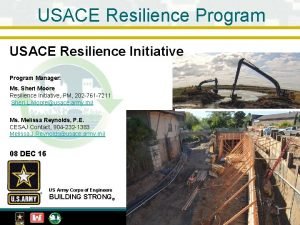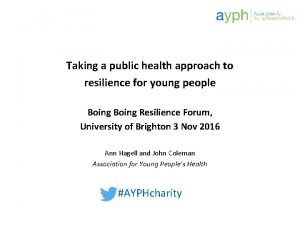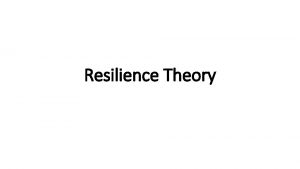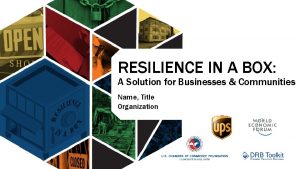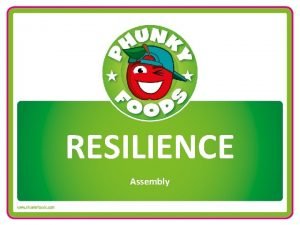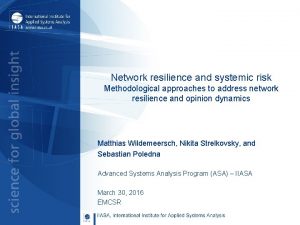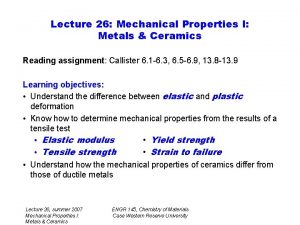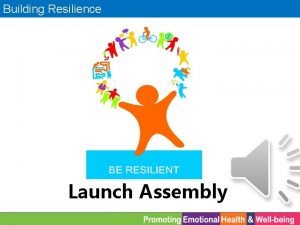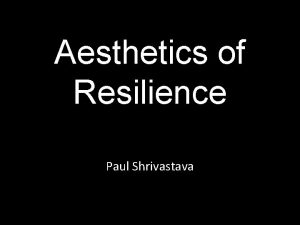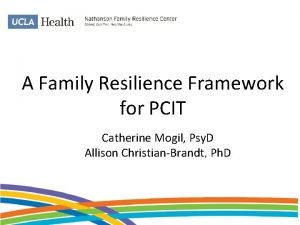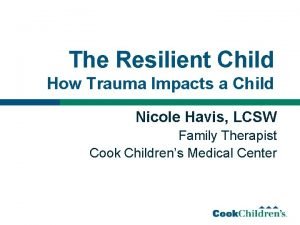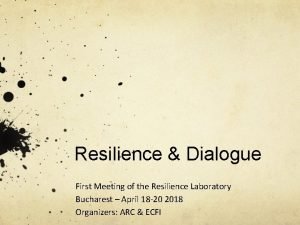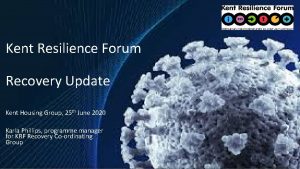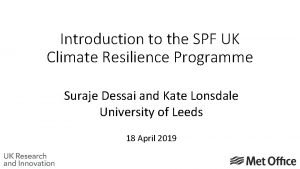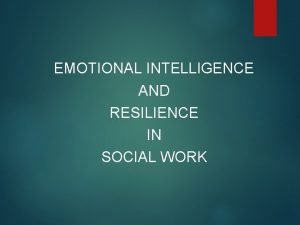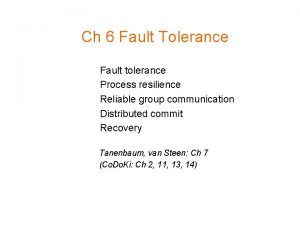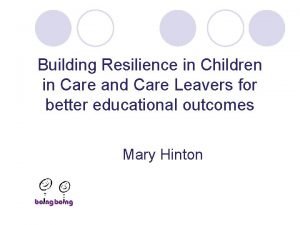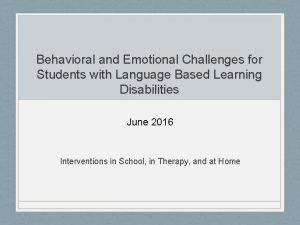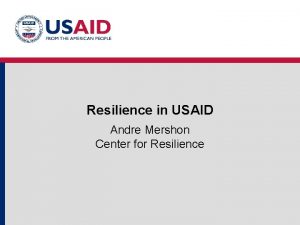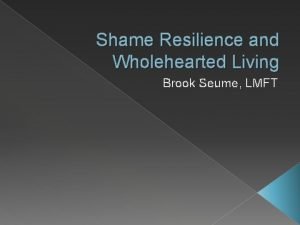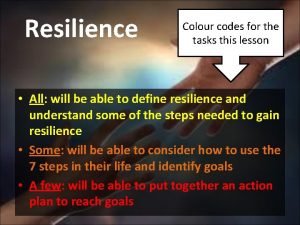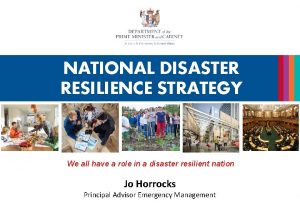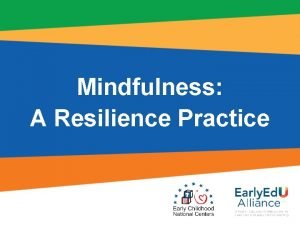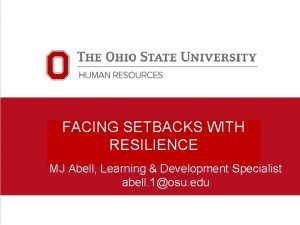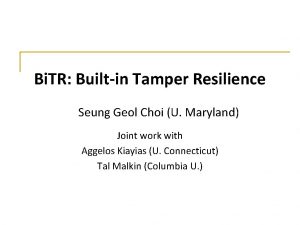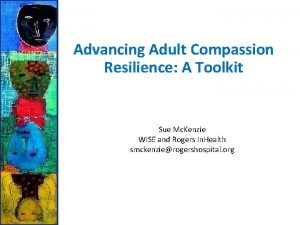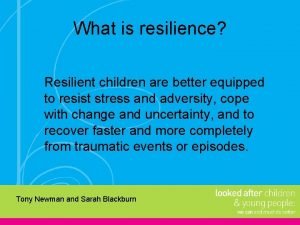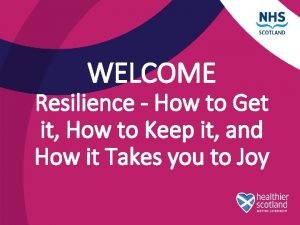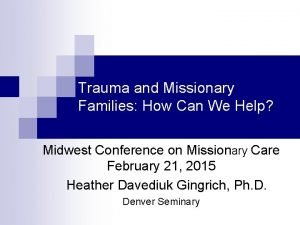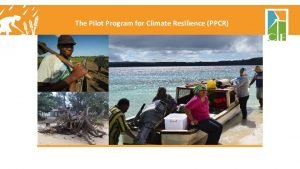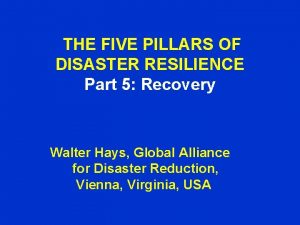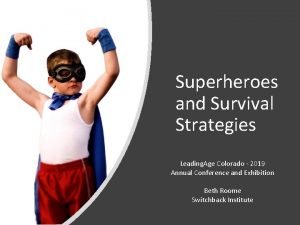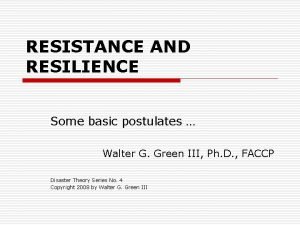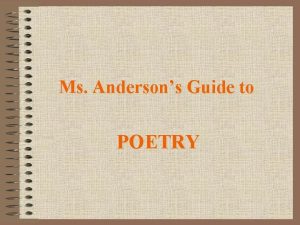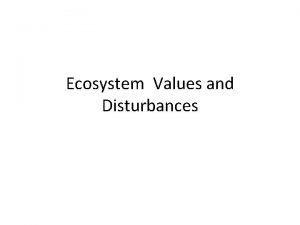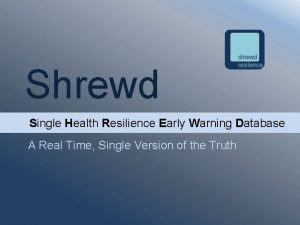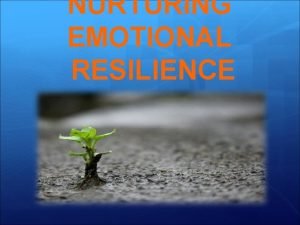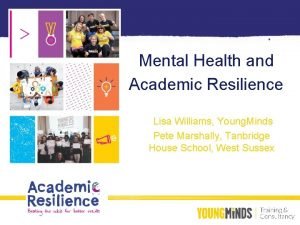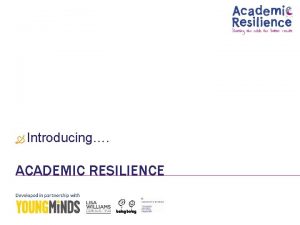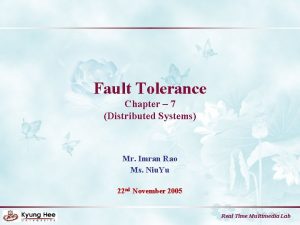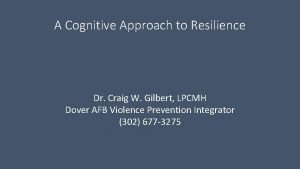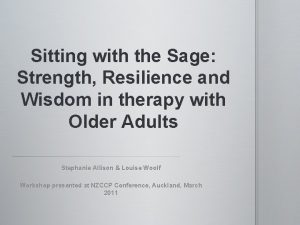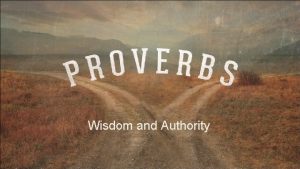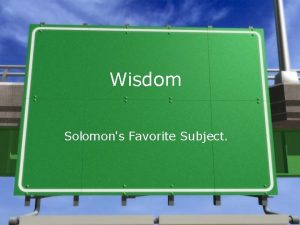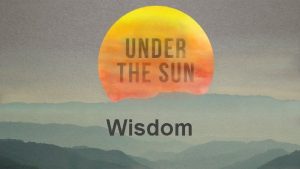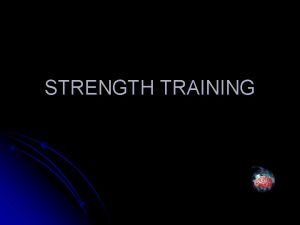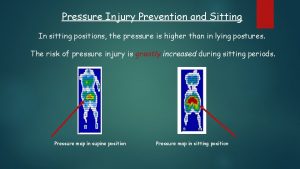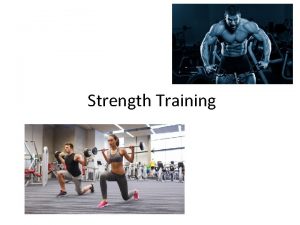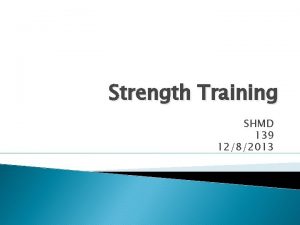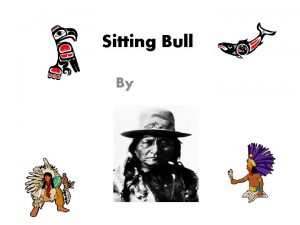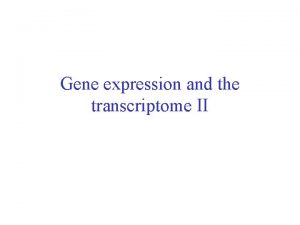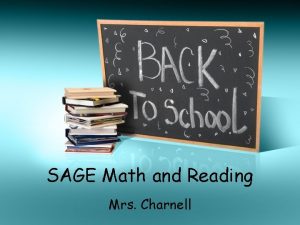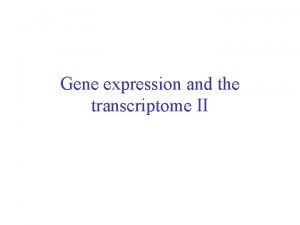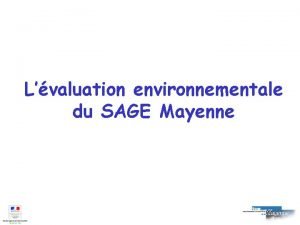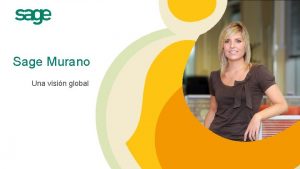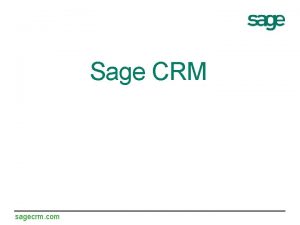Sitting with the Sage Strength Resilience and Wisdom
























































































- Slides: 88

Sitting with the Sage: Strength, Resilience and Wisdom in therapy with Older Adults Stephanie Allison & Louise Woolf Workshop presented at NZCCP Conference, Auckland, March 2011

Overview Introduction – What is Wisdom? Therapist Wisdom Client Wisdom When Wisdom fails… Conclusion

Part I Introduction: What is Wisdom?

Definition of Wisdom: Dictionary definition: 1. The quality of being wise; knowledge, and the capacity to make due use of it; knowledge of the best ends and the best means; discernment and judgment; discretion; sagacity; skill; dexterity. 2. The results of wise judgments; scientific or practical truth, acquired knowledge, erudition. 1. The ability to discern or judge what is true, right, or lasting; insight. 2. Common sense; good judgment. 3. The sum of learning through the ages; knowledge; wise teachings of ancient sages. 4. A wise outlook, plan or course of action. 5. Wisdom – Bible – Wisdom of Solomon

Definition of Wisdom: Wisdom is a deep understanding and realizing of people, things, events or situations, resulting in the ability to choose or act to consistently produce the optimum results with a minimum of time and energy. It is the ability to effectively and efficiently apply perceptions and knowledge and so produce the desired result. It is also the comprehension of what is true or right coupled with judgment as to action. Wisdom requires control of one’s emotional reactions so that principles, reason and knowledge prevail to determine one’s actions.

Definition of Wisdom: Sayings: “Older and wiser” . . a sadder and a wiser man I rose the morrow morn. . Yes I’m wise, but it’s wisdom born of pain. . “the wisdom of hindsight. . ”

Definition of Wisdom: Knowledge Understanding Experience - Something that is learned, passed down, from the past The right words at the right time in the right way Has a spiritual aspect to it – a connection to the larger picture of life and humanity - Morality

Definition of Wisdom: The opposite of wisdom – foolishness Defined as –lacking or exhibiting a lack of good sense or judgment; unwise, silly; resulting from folly or stupidity; not worthy of consideration; weak-minded Includes sense of recklessness, rushing in, “putting your foot in it”, quick to speak,

Through the eyes of a child… Wisdom through the eyes of a child – Stephanie’s grandson

T: What does wise mean, Mana? M: (Thinks hard, then. . ) It means knowing the right thing to do T: Who is wise, Mana? M: Well, Mummy and Daddy are wise, Granny and Pops are wise, Mana and Grandpa are wise T: I think I am a little bit wise, too (and maybe he is – he knows the limitations of his wisdom…)

Wisdom Traditions: Early concepts of wisdom Greek Goddess of Wisdom – Sophia Socrates Aesop’s Fables Plato

Wisdom Traditions: Sophia – the Greek word for wisdom Ancient Greeks associated wisdom with virtue Philosophy – meaning the love of wisdom Personified in the goddess Sophia Found throughout the Bible, often associated with King Solomon

Wisdom Traditions: Plato – mentions the virtue of wisdom, as knowledge about the Good and the courage to act accordingly. The Good for Plato– involving perfect ideas of good government, love, friendship, community, and a right relationship with the Divine. Socrates – only claimed that he did not know, and of this he was certain – and showed contradictions in claims of others

Wisdom Traditions: In the Bible – Books of Wisdom – include Ecclesiastes, Proverbs, Song of Solomon, Job, Psalms. Proverbs – pithy sayings – holding truth, knowledge, learning Proverbs – “for attaining wisdom and discipline; for understanding and words of insight…” “The fear of the Lord is the beginning of knowledge, but fools despise wisdom and discipline. ” “Wisdom is supreme, therefore get wisdom. Though it cost all you have, get understanding. ”

Wisdom Traditions: An Inuit Elder – said – “ a person becomes wise when they can see what needs to be done and do it successfully without being told what to do. ” Holistic – believe that wise people sense, work with and align themselves and others to life – appreciating the fundamental interconnectedness of life It Taoism, practical wisdom is described as knowing what to say and when to say it

Wisdom Traditions: Nicholas Maxwell – a modern philosopher – argues that the basic aim of academic inquiry should be to seek and promote wisdom. Wisdom is understood as the capacity to realize what is of value in life for oneself and others.

Wisdom Traditions: Two wisdom traditions exist (Rice, 1958) – Contemplative and Prudential. Contemplative traditions (such as monastic) emphasize meditation on one’s experience as a pathway to the divine Prudential traditions recognize the judicious and purposeful application of knowledge that is valued in society

Wisdom Traditions: According to Confucius, wisdom can be learned by Reflection (the noblest) Imitation (the easiest) Experience (the bitterest) Wisdom is not “told” by self unless asked for by another – it is ‘sought’

Wisdom Traditions: Buddhist scriptures teach that a wise person is endowed with Good bodily conduct Good verbal conduct And good mental conduct A wise person does actions that are unpleasant to do but give good results, and doesn’t do actions that are pleasant to do but give bad results.

Wisdom Traditions: “By quietude alone does not become a sage if he is foolish and ignorant. But he who, as if holding a pair of scales, takes the good and shuns the evil, is a wise man; he is indeed a sage (muni) if by that very reason. He who understands both good and evil as they really are, is called a true sage.

Wisdom Traditions: Aspects of wisdom More than just knowledge – understanding Contains emotional, intellectual, and spiritual elements – insight, deeper level understanding. Knowledge applied Right words at right time

Who is wise? Examples of “the wise” Sage Magi Elder/Kuia/Kaumatua Guru Soothsayer

Who is wise? A wise person has self-knowledge A wise person seems sincere and direct with others Others ask wise people for advice A wise person’s actions are consistent with their ethical beliefs

Who is wise? Many different cultures have ‘wise’ elders or members of the community Often are sought for advice and direction Often associated with age, experience, or having been tested or challenged in some way Role of kuia/kaumatua/tohunga in Maori culture

Who is wise? Examples of the “Wise” Socrates – had knowledge and understanding yet taught by asking questions and getting his students to discover truth Solomon – distilled his years of wisdom and understanding into sayings “proverbs” that held the essence of learning and could be applied throughout life Jesus – taught wisdom and understanding through stories and parables – allowed for each individuals response/place in the journey – “He grew in wisdom and stature…

Who is wise? One of the attributes of King Solomon is wisdom As a new king, the Lord appeared to Solomon in a dream and said “Ask for whatever you want me to give you. ” Solomon replied that God had shown great kindness to him because his father was faithful to God.

Who is wise? “Now, O Lord my God, you have made your servant king in place of my father David. But I am only a little child and do not know how to carry out my duties. Your servant is here among the people you have chosen, a great people, too numerous to count or number. So give your servant a discerning heart to govern your people and to distinguish between right and wrong. For who is able to govern this great people of yours? ”

Who is wise? The Lord was pleased that Solomon had asked for this. So God said to him, “Since you have asked for this and not for long life or wealth for yourself, nor have asked for the death of your enemies but for discernment in administering justice, I will do what you have asked. I will give you a wise and discerning heart, so that there will never have been anyone like you, nor will there ever be. ” I Kings 3: 7 -12

Who is wise? I Kings 4: 29 -34 “God gave Solomon wisdom and very great insight, and a breadth of understanding as measureless as the sand on the seashore. Solomon’s wisdom was greater than the wisdom of all the men of the East, and greater than all the wisdom of Egypt… And his fame spread to all the surrounding nations. He spoke three thousand proverbs and his songs numbered a thousand five. He described plant life…He also taught about animals and birds, reptiles and fish. Men of all nations came to listen to Solomon’s wisdom, sent by all the kings of the world, who had heard of his wisdom. ”

What is wisdom for? Wise decisions – impact on own life Wise counsel – impact on lives of others Wise judgments – impact on society Material, social and psychological outcomes Wisdom is always and only seen in actions

What is Wisdom for? Also used wisdom to judge the people – A wise ruling – two woman live in same house, both with babies, one died in night, both arguing that the live child was theirs. Solomon orders the baby be cut in half. The mother of the child says no, don’t kill him, let her have him. The King gives her the baby. “When all Israel heard the verdict the king had given, they held the king in awe, because they saw he had wisdom from God to administer justice. ”

What is Wisdom for? The Serenity Prayer: God grant me the serenity to accept the things I cannot change; The courage to change things I can; And the wisdom to know the difference.

How do we get wisdom? Learned knowledge Lived experience – learning from mistakes Vicarious experience – watching the actions of others Perspective – taking in another’s point of view Importance of humility

How do we get wisdom? Wisdom something that is often sought- by ourselves and from others Many older people who reflect on wisdom say that most wisdom they have gained has been through difficult experiences and challenges Wisdom is something we try to pass on – to prevent others from making the same errors – or going through the pain/struggles we might have However, wise advice often discounted by the younger generations – there is a sense in which we have to make the journey ourselves

Wisdom and Age: Wisdom often associated with age – growing older and wiser… but is it? Is wisdom different in youth, middle age, older adults? Is the key the ability to reflect on and learn from life? Wisdom as something which is developed/grown through life experiences So how does one gain wisdom?

What is Wisdom? What aspects of this presentation so far, stand out for you in terms of understanding wisdom and the role it might play in your life and work?

Part II Therapist Wisdom

Therapist Wisdom As therapists our own development – including that of wisdom are integral to our practice We learn from life experiences, but also from our interactions with clients The role of reflective practice, supervision, insight and understanding – to look in mirror and see clearly – role of compassion towards self - The difference between theoretical or head knowledge and heart knowledge/understanding

Therapist Wisdom Reflect on key life experiences or particular clients that you have grown/learned from in some way? In what ways have these experiences contributed to the development of wisdom in your own life?

Therapist Wisdom My Own Journey - Stephanie “There are places I remember, all my life, though some have changed…” Experiences both pragmatic and profound Pain, shame, amazement, gratitude…the emotional content of “wisdom experiences” A shift in perspective and priorities - ? maturity

In my life… There are places I remember All my life - though some have changed – Some forever, not for better Some have gone, and some remain. All these places have their moments With lovers and friends I still can recall - Some are dead and some are living but in my life I've loved them all

Therapist Wisdom My Teachers Older colleagues – “that was my fault” Younger colleagues – “he’s a bastard” – the advantages of black and white thinking! Family and friends who model wisdom My supervisors My clients – “I know you’re doing your best – BUT. . ” Reflection on my own errors – see “booboos I have made”

Therapist Wisdom Personal Reflections: Is often issues of difficulty or struggle that prove instrumental in the development of wisdom Key life transitions also integral learning times Adjustment, grief, loss, personal or other crises or events often key times of learning and development The ability to hold the paradox of life – we are not all good or all bad – (best of man/worst of man) Being “fully present” Knowing limitations

Therapist Wisdom Personal Reflection What has made a difference for clients? When has it seemed that the connection has been more than knowledge – a sense of deeper insight Feeling heard, respected, valued, understood When formulations ‘get it’ Listening for cues in client language, images, memories, - their story Reflect on a story that holds true for your life

Therapist Wisdom The journey so far Privilege of working with people – The book thief Key clients Mrs T – connection/compassion Robbie - storytelling Mrs B – metaphor/imagery Mr I – grief and loss Mrs H – importance of ‘getting it’ right with formulation

In therapy with older adults, who is the sage? The client as sage Older than therapist More life experience More life roles /stages The therapist as sage More knowledge More specific experience A wisdom-implicit role Ambiguities and tensions in the relationship Applies in all therapy but highlighted with older adults

Therapist as sage: a warning Your wisdom and knowledge led you astray and you said to yourself “I am God, there is no-one else like me” (Isaiah 47: 10) Ouch!!! – see the importance of humility? ?

The older client as sage Older and wiser vs Silly old fool Experience vs cognitive changes Gains and losses of late-life cognition (Vintage Minds - H. Paton) Crystallised vs fluid intelligence Logos (speedy and efficient intellect) vs mythos (pragmatic and value-laden intellect) – Labouvie. Vief 1990) Specific cognitive tasks of late life – passing on to others

Schaie's 5 cognitive stages: Acquiring: childhood and adolescence - acquisition while living in a protected environment. Problem solving skills limited to specific tasks. Achieving: Young adulthood - achieving competence requires broadening of cognitive functions. Problem solving more role-related and goal-oriented. Social implications of decisions become more important. **IQ testing tends to focus on these 2 stages

Schaie's 5 cognitive stages: Responsible: Middle adulthood - Undertake responsibility for other (e. g. family). Problems of real life, long-tem goals, and acquiring a family, require further change in cognitive functioning. Increased skills in relevant problem solving tasks, shifts in cognitive style to greater flexibility and lessened field dependence. Gain in crystallised, loss in fluid abilities, which are less relevant to the experiential demands upon the individual

Schaie's 5 cognitive stages: Executive: Middle adulthood - may be reached in response to more responsibility in society with its complex systems and relationships. There is a balancing of logos taking place as mythos is improved. Improvement in skills such as inductive reasoning, blunting of other skills such as dealing efficiently with new information

Schaie's 5 cognitive stages: Reintegrative: Later adulthood - some roles, such as parenting, are reduced. Individuals become more selective in matters they attend to. Those demands which are still meaningful or are of universal interest become the new focus rather than simply responding to achieve competence. For example, older adults may be particularly interested in searching for abstracts which will remain constant and trustworthy Logos – speedy and efficient intellect Mythos – pragmatic and value-laden intellect

Expansionist view of latelife cognition Older adults: Specialists in interpreting and encoding new info with help of prior knowledge Combine text with psychological and symbolic perceptions formed by past experience Less accurate in terms of exact content but more efficient method to remember and pass on cultural information to younger generation (Adams et al, 1990) Use of interpretations, demonstrations, simplifications. Explanations that would satisfy both adults and children (H. Paton)

Part III Client Wisdom

Client Wisdom CBT collaborative in nature The role of relationship Client as expert of their own experience, life, journey At times we are so close to it, we miss things, or become stuck and can’t see bigger picture Role of strengths, resilience and coping – all behaviour as coping in some form – helpful, less helpful ways

Client Wisdom Examples of ‘wisdom’ – essence of learning/life Stories which encapsulate this seemingly universal journey towards wisdom and the embracing of life– The Miraculous Journey of Edward Tulane The Quiltmaker’s Gift Pilgrims Progress The Hero’s Journey The Wizard of Oz Lord of the Rings

Client Wisdom The universality of the human story The Hero’s Journey We all have a story – unfolding in life – a beginning, middle and end We all meet people along the way, and some of these people play a key role in who/what we become For each of us there are challenges and ‘tasks’ to overcome on this journey – who we become is connected to our responses to the challenges we face

Client Wisdom The Hero’s Journey – The Hero with a thousand faces – Joseph Campbell “the really creative acts are represented as those deriving from some sort of dying to the world. ” “The Hero’s journey always begins with a process of alienation or separation from the tribe, followed by a series of difficult challenges that the hero must meet alone. The journey culminates in a descent into the abyss of self-doubt and a loss of faith in the Divine, but then results in a vital transformation and a renewal of trust, which in turn leads to a revelation of some new knowledge, insight or wisdom. The hero then returns to the tribe and imparts this insight – or tries to. ” – Caroline Myss – Sacred Contracts, p 65.

Client Wisdom

Client Wisdom The Wonderful Wizard of Oz – the challenges we all face on the yellow brick road A cyclone – she is separated from her tribe – she has to find strength within herself “I’ve a feeling we’re not in Kansas anymore. ” Guardian is Toto the dog She meets challenges along the way (Wicked Witch of the East) Key figures – Scarecrow (who doesn’t have a brain/doesn’t know what to do? ), Tin Woodman (rusted into immobility), Cowardly Lion (immobilized by fear) – courage, head and heart Throughout the journey Dorothy has to call on her courage, head and heart to overcome the challenges and complete the task Returns home “There’s no place like home. ”

Client Wisdom How do we tap into client wisdom? Like Socrates – it is important to ask the right questions – questions that cause client to reflect – What do you make of that? What did you learn from that experience/period in your life? In what ways has that experience shaped you as a person? Is there a story/image associated with the place you find yourself in at present? How have you coped with difficulties or challenges in the past? What is different this time?

Client Wisdom Where might the client be in this ‘hero’s journey. ’ What are the particular challenges they are facing currently. Who are their tin man, cowardly lion, scarecrow – their companions

Client Wisdom Creating transformation Old System/New System Shift from changing old system and beliefs to focus on new system/beliefs – how would like life to be How would you like to write the next chapter of your life? What needs to change/happen for these things to occur? What important things remain unfinished at this stage of your journey?

Client Wisdom The story of the Lily bulb – a life metaphor introduced in therapy

Part IV When Wisdom Fails

When Wisdom Fails What do we do when wisdom – our own or that of client – fails to bring about the desired change in circumstances?

When Wisdom Fails Sometimes despite wise advice – we choose to go our own way This in itself is part of the nature of being human (although hard to watch at times) It may be that certain life situations/challenges will continue to present themselves to us until we learn from them what needs to be learn and change our responses

When Wisdom Fails We can learn from mistakes and struggles Even the wisest of men – Solomon – made mistakes at the end of his life – and that was with all his wisdom and knowledge If people choose to keep going a certain way, cannot embrace change, that is their right – we can maintain compassion and care

When wisdom fails – There’s no fool like an old fool – age is a necessary but not sufficient factor in the development of wisdom Rising from the ashes – building strength and resilience Folly, failure and pain can be the building blocks of wisdom

WWF 1: Being done wrong to: Diana 35 year relationship with “absolutely charming” man Dumped – asked for small share of property “Charmer” becomes vindictive, cruel, punitive The double bind If he is charming then it must be my fault If he is a psychopath then our relationship was a sham and I have been a fool for 35 years

Therapist questions Developing wisdom Continua rather than dichotomies Humans as complex curates eggs rather than plaster saints Understanding the factors that made her vulnerable Other ideas? ? Developing strength and resilience Accepting self as imperfect but OK Other ideas? ?

WWF 2: Doing wrong to others: Maude Well connected professional woman (accountant) Fluttered on horses, pokies Made redundant – impact on self esteem Gambling increased as compensation Used her knowledge (wisdom? ) to access money dishonestly at expense of others Caught/found out – suicidal Loss of home/family money Prosecution sentence

Therapist role How can therapist work wisely in this circumstance Help client feel good about herself? Face up to reality/consequences? Deal with consequences of facing up to consequences? How to respond to lawyer request for affidavit re mental state? Moral vs legal/ethical issues

Therapist questions Developing wisdom Understanding of addictions Understanding of what made her vulnerable Insight into own actions Strength and resilience Facing up to family and friends Accepting consequences to self and others Choosing not to “opt out” through suicide What redemptive elements could we have incorporated?

WWF 3: Cognitive change What is the impact of cognitive change on wisdom Are they separate constructs (mythos vs logos) Is emotional wisdom un derstanding different from intellectual wisdom? Is it intact in the presence of cognitive change? What about spiritual wisdom?

Therapist questions How to interact therapeutically in the presence of cognitive change Likely obstacles: More concrete thinking Impaired/patchy memory Poorer logical reasoning Poorer impulse inhibition and emotional control

Likely strategies Respect and patience Pragmatic use of tools Written notes Repetition and practice especially in-session Simplifying ideas Concrete examples Drawings, diagrams, symbols, metaphors Focus on what can be done rather than what cannot Don’t be over-awed by cognitive change – we adjust to it all the time (eg 20 yr old thinks differently from 45 yr old) Interventions appropriate to life-stage

WWF 4 – therapist (Booboos I have made) Failure of knowledge – generally not so bad Failure of wisdom – impact on empathy, judgement, professional identity The Wailing Woman – failure of empathy. Lack of humility The Saddest Man in the World – inaccurate empathy, shift from therapist role All Black’s Widow – inaccurate focus leading to discouragement and negativity

The wise therapist Techniques – CBT, narrative etc Plus skills – conceptualisation, insight Plus qualities of character – genuine empathy, respectfulness, optimism, humility

Building resilience: the archaeological dig Acknowledging that mere survival to age 70 -odd implies a degree of resilience Having uncovered the “artefacts” of strength and resilience, the trick is to apply them to the present Circumstances may be very different and the specifics of past strengths may not be relevant However, the concept is likely to remain applicable (an independent thinker, a people person, a practical person) – eg can’t read, but can listen to radio The strength may be used in different ways (eg the stainless steel mixing bowl in earthquake Christchurch

Building resilience Resilience also involves creating a supportive and comfortable environment for the person to access their old strengths Alicia, newly in RH, poor sleep Used to get up and make cuppa, listen to radio No cups available in tea area at night, teamaking discouraged Only small intervention needed – cups of her own, facilitation of RH staff

“Therapist wisdom” with Alicia Listening to what she actually wanted To be heard and understood, rather than to be jollied along Acknowledgement of grief and loss, both present and previous Links across generations and her role in this Simple anxiety management strategies (had been given oxygen machine) Liaison between Alicia, RH staff and family Often a very brief intervention can achieve a lot – as with Alicia

Hindsight The benefit of hindsight The wisdom of hindsight But is hindsight really wise? “if I had done X instead of Y, all would have been different/better” – but would it? Maybe X would have led to a different but worse path (hindsight as a fallacy) we yearn to excise one undesirable element but retain all the related valued elements -ie the friends, experiences, children that were part of a difficult marriage (hindsight as a selective tool)

Hindsight as a learning tool Hindsight as a fallacy – Looking back on regrets, if onlys, what ifs (rumination) Hindsight as a learning tool Reminiscence Reflection Dealing with the present “Why” as a futile and unhelpful question “How” and “what” as more constructive

Applying therapy wisely with older adults What I have learned from my clients “You’re a very nice girl, Stephanie, and I know you’re doing your best, BUT… (lesson) don’t be a slave to theory and technique “I’ve been thinking about what you said last week. . ” (lesson) don’t interpret non-response as nocomprehension – allow time for the client to reflect “That tummy stuff – it was stress, wasn’t it” (lesson) simple concepts may need to be repeated and reinforced many times for them to become internalised by the client – so don’t give up. If your formulation is accurate, then stick with it

The pragmatics of therapy in later life “I have a huge history of mental health issues dating back to young adulthood. . ” (lesson) this may or may not need to be addressed. What is going on in the present and how can it be helpfully approached? The pragmatics of later life – is this worth addressing? What is the simplest way of achieving a result (usually dealing with the here and now) Turning problem longevity to advantage “you have survived a life-time of this – what have you learned that we can use now? ”

Part IV Summary

Summary God grant me the serenity to accept the people I cannot change, the courage to change the one I can, and the wisdom to know it’s me – variation Reinhold Neibuhr
 Godly wisdom vs earthly wisdom
Godly wisdom vs earthly wisdom Godly wisdom vs worldly wisdom
Godly wisdom vs worldly wisdom Earthly wisdom
Earthly wisdom Tensile strength and yield strength
Tensile strength and yield strength Half strength darrows
Half strength darrows Percentage strength v/v formula
Percentage strength v/v formula How to calculate ratio strength
How to calculate ratio strength Nc resilience and learning project
Nc resilience and learning project Social-emotional assets and resilience scales pdf
Social-emotional assets and resilience scales pdf National risk and resilience unit scotland
National risk and resilience unit scotland Pqa example answers
Pqa example answers Building grit and resilience
Building grit and resilience Resilience index measurement and analysis
Resilience index measurement and analysis Empathy theories johannes volkelt
Empathy theories johannes volkelt Jesus grew in knowledge
Jesus grew in knowledge Wealth and wisdom institute
Wealth and wisdom institute Wisdom excels folly
Wisdom excels folly Dua for knowledge
Dua for knowledge The wisdom of proverbs job and ecclesiastes
The wisdom of proverbs job and ecclesiastes William shakespeare
William shakespeare Types of resilience
Types of resilience Boing boing resilience
Boing boing resilience Meaning of resilience
Meaning of resilience Resilience in a box
Resilience in a box Resilience assembly
Resilience assembly Network resilience a systematic approach
Network resilience a systematic approach Flexibility in dental materials
Flexibility in dental materials Modulus of resilience
Modulus of resilience Assembly on resilience
Assembly on resilience Paul shrivastava
Paul shrivastava Catherine mogil
Catherine mogil I have resilience
I have resilience Emotional resilience in nursing
Emotional resilience in nursing Army mrt modules
Army mrt modules I have resilience
I have resilience Kent test forum
Kent test forum Uk climate resilience programme
Uk climate resilience programme Emotional resilience in social work
Emotional resilience in social work Resilience vs fault tolerance
Resilience vs fault tolerance I have resilience
I have resilience I have resilience
I have resilience Emotional resilience lds manual
Emotional resilience lds manual Mershon center
Mershon center Resilience pyramid
Resilience pyramid 4 elements of shame resilience
4 elements of shame resilience Resilience direct
Resilience direct Resilience colour
Resilience colour National resilience strategy
National resilience strategy Resilience practice
Resilience practice Resilience
Resilience Resilience
Resilience Azure resilience patterns
Azure resilience patterns Compassion resilience toolkit
Compassion resilience toolkit Receliance
Receliance Resilience meaning
Resilience meaning What is psychological first aid
What is psychological first aid Pilot programme for climate resilience
Pilot programme for climate resilience What are the 5 pillars of resilience?
What are the 5 pillars of resilience? Resilience
Resilience Resilience examples
Resilience examples Bonnie benard resilience
Bonnie benard resilience Haiku about spring 5-7-5
Haiku about spring 5-7-5 Ecosystem resistance definition
Ecosystem resistance definition Shrewd resilience
Shrewd resilience Definition of emotional resilience
Definition of emotional resilience Young minds resilience
Young minds resilience Academic resilience
Academic resilience Process resilience in distributed system
Process resilience in distributed system Camp resilience
Camp resilience Abcs of resilience
Abcs of resilience Hình ảnh bộ gõ cơ thể búng tay
Hình ảnh bộ gõ cơ thể búng tay Frameset trong html5
Frameset trong html5 Bổ thể
Bổ thể Tỉ lệ cơ thể trẻ em
Tỉ lệ cơ thể trẻ em Voi kéo gỗ như thế nào
Voi kéo gỗ như thế nào Tư thế worm breton là gì
Tư thế worm breton là gì Bài hát chúa yêu trần thế alleluia
Bài hát chúa yêu trần thế alleluia Môn thể thao bắt đầu bằng chữ đua
Môn thể thao bắt đầu bằng chữ đua Thế nào là hệ số cao nhất
Thế nào là hệ số cao nhất Các châu lục và đại dương trên thế giới
Các châu lục và đại dương trên thế giới Công thức tính thế năng
Công thức tính thế năng Trời xanh đây là của chúng ta thể thơ
Trời xanh đây là của chúng ta thể thơ Cách giải mật thư tọa độ
Cách giải mật thư tọa độ Phép trừ bù
Phép trừ bù độ dài liên kết
độ dài liên kết Các châu lục và đại dương trên thế giới
Các châu lục và đại dương trên thế giới Thể thơ truyền thống
Thể thơ truyền thống Quá trình desamine hóa có thể tạo ra
Quá trình desamine hóa có thể tạo ra Một số thể thơ truyền thống
Một số thể thơ truyền thống
